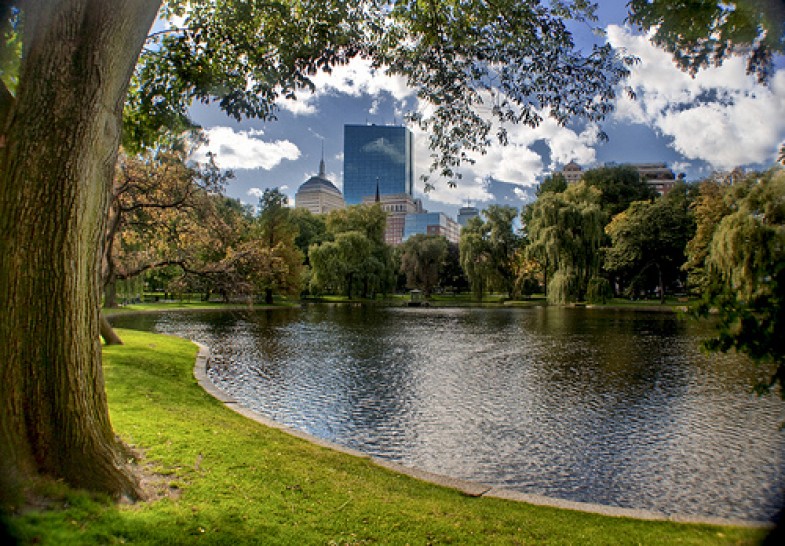The Boston Common could be going corporate. Really. And with the mayor’s apparent blessing.
For centuries, the storied Boston Common has been at the center of the city’s life, a place where anyone could hang out and find a bit of relief from the bustling city in the park’s green expanses. The Common belongs to everyone. It has been a place for military drills, concerts, political rallies, religious revivals, picnics, Frisbee-throwing and much else.
But soon, if Mayor Thomas Menino and the putative Friends of the Public Garden have their way, the Common could be the host for all sorts of corporate sponsorships and advertising, reports the Boston Globe. The Friends of the Public Garden have been talking with the New York City consultant that rescued the dilapidated Bryant Park in Manhattan by handing it over to corporate events and sponsorships.
This is what mayors and corporations like to call a “win-win.” A distressed public resource is refurbished without tax monies, using corporate advertising and sponsorships, and suddenly — Abracadabra! – a decaying public space is lovely. Ah, but like any magic trick, a sleight of hand is necessary. What once was public has now become a quasi-corporate resource. Its character has changed. The public is no longer the sovereign owner. Public authorities must now be very responsive to private, commercial demands, because, well, we know where the money is coming from. He who pays the piper calls the tune.
Words like “fiscal realities” and “hard choices” will be trotted out to justify the transformation of the Common. Where once the park was truly a gathering place that reflected the self-styled interests of the people, soon the Common will feature ads that remind us of the real powers who run our society, corporations. (And surely you’re heard — the Supreme Court has declared that corporations ARE people, so shouldn’t they have the right to advertise in the park?)
I can see it now: the Ronald McDonald playground with the Hamburglar slide. Park benches festooned with Visa advertisements (“we’re everywhere you want to be!”). A Starbucks kiosk. Landscaping work sponsored by Home Depot, complete with roving do-it-yourself consultants in orange aprons.
Oh no, no, its backers will object. We would only approve tasteful and discreet signage. Nothing garish! Nothing too commercial! “I’m not going to have banners hanging all around the Common and making it a circus atmosphere,” said Mayor Menino.
Yeah, it always starts out that way – until the commercial upside becomes irresistible, no one wants to argue for “higher taxes” to support the park, and why, think how nice it would be to have a new band shell (sponsored by Bose speakers) and electronic news-crawl (thank you, Fox News!). The next thing you know, the politically connected big corporations have taken over the place, and citizens have become guests in their own park. Just look what happened to the public’s airwaves and now, the Internet.
The Boston Common was once a refuge from commercialism – but this is precisely what makes it such a prime venue for commercialism. It’s a virgin public space. It’s uncluttered and open and free of competing advertisements. It’s centrally located, it is impossible to ignore, and it has the blessings of the city itself: the perfect venue for high-toned advertisers to buff their images and reach new customers – all in a milieu that bespeaks public-spiritedness!
I have an idea: If all those public-spirited corporations really care about the Common, why don’t they simply donate the money outright, without seeking any advertising or naming rights in return? (I would concede granting donors a modest plaque recognizing them at a park entrance.)
If the citizen of Boston have any self-respect, they will blast this misguided proposal out of the water and send a sharp, pointed message to Mayor Menino: “Keep the Boston Common for the commoners!”
A few years ago, Shirley Kressel, a landscape architect and urban designer, and one of the founders of the Alliance of Boston Neighborhoods, wrote a blog post here at Onthecommons.org warning about the dangers of “public-private partnerships” in managing the Boston Common. I suspect that sentiment is fairly widespread. Fortunately, too, the Boston Globe has checked in on banning corporate sponsors from the park: “The Boston Common has survived on the public’s support through good times and ill since 1634,” said the Globe. “It should be forever shared by all, equally.
Does the Common need renovation and maintenance work? Of course. But bolstering the Common’s maintenance budget with corporate sponsorships sets a dangerous precedent, changes the character of the park and opens the door for further private encroachments of the public’s resources. Why is it that public leaders have so much trouble standing up for the public? Why are they so eager to strike up cozy “private-public partnerships” rather than make full-throated defenses of the public’s crown jewels?
Mayor Menino and the city’s power elite should put aside the plans to corporatize the Boston Common, and instead rally the people of Boston to defend and improve the Boston Common. The commoners themselves should rise up to demand that their park remain their park, so that it may remain a preserve for the people. Unless they do, the Boston Common may not be a common much longer, and something significant and historic will be lost.




